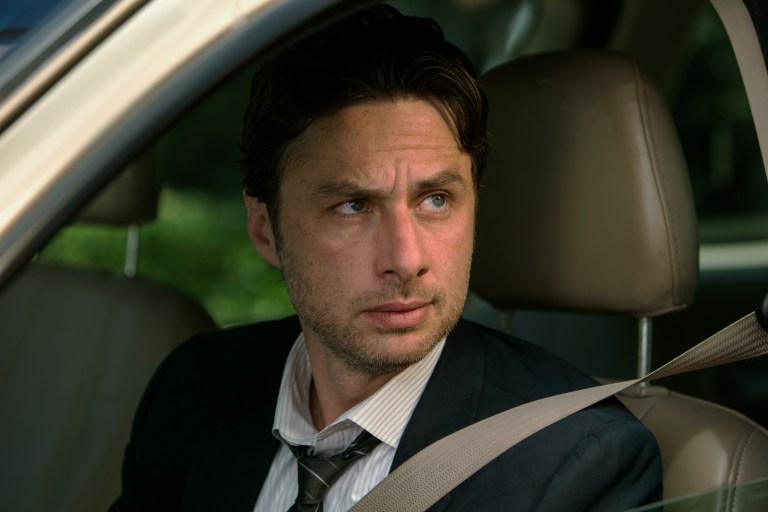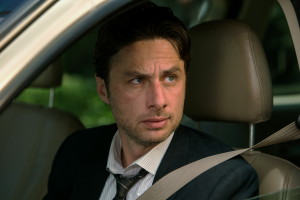
Director and actor Zach Braff made waves in 2004 with his directorial debut and soon-to-be-cult-classic, “Garden State.” Now, Braff is back with his Kickstarter-funded “Wish I Was Here.” The film follows struggling actor Aidan Bloom (Braff) and his efforts to navigate his rocky relationship with his wife Sarah (Kate Hudson); support his children, Grace (Joey King) and Tucker (Pierce Gagnon); care for his cancer-stricken father, Saul (Mandy Patinkin); and come to terms with his own spirituality. We talked with Braff during a roundtable about the subjunctive mood, Kickstarter and the purpose of film.
The Stanford Daily: I was struck by the movie title—“Wish I Was Here” rejects grammatical convention—and I was wondering how you came up with it.
Braff (B): It was a play on the postcard, “Wish You Were Here.” For me, the concept of the whole movie was the struggle to be present in your life — wish I was here, wish I knew how to be … not obsessed about the past or anxious about the future, but present with my wife and kids and in the moment. And it just sounded cooler. And then the added bonus was that [Aidan]’s not an academic. There’s that moment when Joey corrects her mom [about] “who” and “whom.” Their parents … [are] the type of people who would get … “wish I was here” wrong. But my interpretation is that the whole film is a search for spirituality, and if he finds any spirituality, it’s his own quest to be present in his life, now, with his family showing up and not off in his own narcissistic bubble.
The Daily Cal: When the movie started, I thought I was going to watch something different than what [the film] ended up being. When I saw the spacesuit and the guy running with the medieval sword, I was very struck by the mixing of genres. What are you trying to transmit with this?
B: The whole [film] has been about challenging the cherished ways of doing things, even in filmmaking: Oh, it has to be a comedy, oh, it has to be a drama, oh, you can’t have surreal elements in a family movie. One of my favorite movies of all time is “Annie Hall.” What I love about “Annie Hall” is that there were no rules. It was funny sometimes, it was heartbreaking sometimes … all of a sudden there’s a scene and it’s a fully animated cartoon. It was just a great story, and I love all genres. I love Jean-Pierre Jeunet, who finds a way to put fantasy into realistic settings. The fantasies [in “Wish I Was Here”] were sort of like a Greek chorus. What would his childhood fantasy look like if it was manifested in his adult brain with his adult imagination? And what if that [fantasy] was like his guardian angel who was trying gently to push him in the right direction?
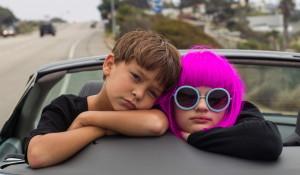
Academy of Art University Newspaper: You funded the movie with Kickstarter. What was the most rewarding aspect of going that route?
B: I didn’t know if it was going to work. In fact, there were so many naysayers … because it hadn’t been done on this level before [and] it certainly hadn’t been done with a new title. I wasn’t saying I’m making “Scrubs: the Movie” … [or] “Garden State Two.” I was saying, “Hey fans, I can’t get this movie made … are you into this?”
When it worked in 48 hours instead of a month, I think everyone’s jaws in Hollywood, including my own, were on the ground. Here I am in San Francisco, delivering on my promises to my backers. One of the main things was, “I’ll come to your city [and] do an advance screening with a Q&A.” That’s a blast for me … meeting my fans. We obviously have similar tastes or they wouldn’t have backed it, so it’s been this awesome community that’s been created … around people with a similar taste in music and film.
The Stanford Daily: Do you think that, particularly because of the Kickstarter effort, your directing style or your acting style has changed between “Garden State” and this movie?
B: I’d like to think I got better. I think my style has always been to just try and be uber-realistic. I try and let the camera roll and have moments that are real, especially with the kids and with Kate. Us … talking about “Game of Thrones” in bed was just me and Kate being silly with each other, but I put it in the movie because that’s what we all do as couples. We have our inside jokes [and] we have our things we laugh about. Her singing to me in the laundry room [was the] same kind of thing. The camping spot was all just riffing with the kids. I try and find those moments when I can be really real and natural and put those in the film because I think that’s what elevates a movie from feeling like you’re just following a script to real people.
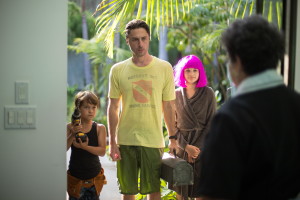
Academy of Art University Newspaper: The soundtrack was a big deal for both “Garden State” and this new movie. How do you go about picking songs that you feel best complement your film?
B: I assemble a mega-playlist that comes not just from me, but also from my editor, music supervisor, friends … and we get maybe 200 songs that are possibilities.
People don’t buy albums anymore; they just buy songs. [So] I tried to make a unique experience by having content that’s available nowhere else, so having at least three original songs by Coldplay, Cat Power, Bon Iver and The Shins … an unreleased Weepies track … there’s an Imogen Heap song that I loved, I just had a singer I really believed in named Allie Moss playing on the ukulele … I tried to create content that isn’t available anywhere else. That’s what you’ve got to do in 2014. Back 10 years ago, people would just buy an album.
The Stanford Daily: Earlier, you mentioned spirituality in the film. You’ve said before that your struggle with spirituality influenced the content of the movie. How do you approach translating those personal experiences for larger screens and larger audiences?
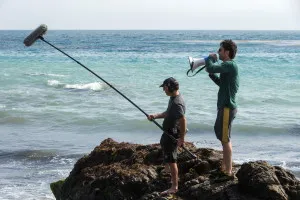
B: I think audiences are so smart. They don’t go, “Oh, I’m not Jewish — time to change the challenge or time to walk out of the theater.” They go, “Insert the religion my parents force-fed me here.” “My Big Fat Greek Wedding” made a billion dollars. I don’t know if I’ve ever met a Greek person, but I can go, “Oh my God, I see aspects of my family in that movie.” I know my audience is intelligent, like, insert Christianity, insert Islam, insert whatever your parents raised you on and you can hopefully relate. Same thing with [Aidan’s] being an actor. Most people aren’t struggling actors, but everyone has a dream. Everyone has something they’re going after, so he or she can insert that there.
The Daily Cal: Is physical cleansing a metaphor for emotional and spiritual cleansing? We see that when your daughter shaves her head, when you’re fixing the fence and the swimming pool. Can you expand on that?
B: New beginnings and chapter changes … [Aidan] even references that [when] he says, “Overdue for a chapter to change.” It was almost like spring cleaning. His father makes fun of that fence. That fence was a thorn in [Aidan’s] side, both literally and figuratively. He wanted to show his dad that he could show up and fix that fence. He could start to clean up that pool, and he could teach his daughter how to swim. He could show up. He wanted to prove to his dad that he could change that chapter.
“Wish I Was Here” hits theaters July 18.
